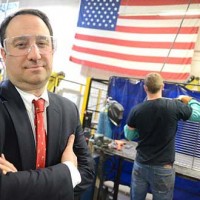 When Drew Greenblatt first acquired Marlin Steel Wire Products, the company seemed like a sure-fire steady income. It was known as “The King of the Bagel Baskets” at a time when new bagel shops were being opened all across the country. Marlin’s commodity bagel baskets had the market almost cornered at about $12 a basket (which provided a very narrow margin), and the possibility of continuing growth in the bagel industry promised a chance for continuing growth.
When Drew Greenblatt first acquired Marlin Steel Wire Products, the company seemed like a sure-fire steady income. It was known as “The King of the Bagel Baskets” at a time when new bagel shops were being opened all across the country. Marlin’s commodity bagel baskets had the market almost cornered at about $12 a basket (which provided a very narrow margin), and the possibility of continuing growth in the bagel industry promised a chance for continuing growth.
However, things did not go according to plan. Shortly after the company was bought by its current CEO, the entire bagel industry would undergo a massive shift and Marlin Steel would be faced with the prospect of extinction. Recently, Forbes featured an article about the trials and tribulations Marlin’s CEO faced shortly after acquiring the company, and the paradigm shift that Marlin underwent to survive those trials.
From Bagels to Boeing: Marlin’s Steel Wire Basket Paradigm Shift
As noted in the Forbes article, less than a year after Mr. Greenblatt acquired the company, “Chinese manufacturers of similar products began shipping to U.S.-based retailers in Marlin Steel’s markets, charging about $6 per basket.” Even at the time, this was less than the cost of the steel needed to make the baskets in the first place. Furthermore, as stated in the Forbes piece: “a low-carb mania had seized the nation, further putting a dent in bagel sales… And as bagel shops began to go under, survivors sought to cut costs by buying metal baskets from cheaper sources.”
The combination of foreign competitors who could massively undercut Marlin’s prices and a sudden drop in overall demand for bagel baskets saw Marlin start to hemorrhage capital.
At that time, Marlin’s new CEO was faced with two choices:
- Close Marlin’s doors—selling off the company’s assets to try and recoup some of his investment costs.
- Find a new niche—one that would keep all of Marlin’s people employed and save the company.
But, what new market could Marlin enter that other commodity basket makers couldn’t drown in cheap knockoffs? For a while, nobody at Marlin Steel could answer that question. Then, as pointed out in the Forbes article, Marlin “received a small order for 24 high-end custom steel baskets from an engineer at Boeing who seemed unconcerned about paying the relatively high price of $25 per unit. ‘That was when the lightbulb went off… I’m focused on the wrong area.’”
After that fateful call, Drew decided to completely shift the focus of the company. No longer would Marlin Steel make inexpensive commodity baskets that virtually any cheapskate could copy. Instead the company would focus on creating custom-engineered steel wire baskets for industries that needed extreme precision that commodity competitors simply could not fulfill.
How Marlin Made the Transition to High-Quality Custom Baskets
The transition from making simple display baskets for bagel shops to serving the millimeter-precise needs of aerospace, scientific, automotive, and other high-precision industries was not without growing pains. The need for changes became obvious during the process of manufacturing the Boeing baskets, as Marlin’s production team struggled to meet the incredibly tight parts tolerances required by Boeing.
To consistently achieve results that would satisfy the needs of clients like Boeing, Marlin needed to make new investments in training to improve employee skills as well as automated manufacturing tools to improve the precision of Marlin’s assembly methods. As noted by the Forbes article, “The changes made over the years required an investment of some $6 million, which came from bank loans and from the decision to reinvest profits to the company.”
Investing in employee learning and factory automation held benefits beyond simply improving Marlin’s ability to precisely manufacture custom stainless steel wire baskets. The switch to automation and empowering employees helped to enhance Marlin’s manufacturing safety. Where once employees would regularly become injured through repetitive motion stress, sharp wires cutting off body parts, and various other manual labor mishaps, robots could now take on the dangerous work while human operators stand at a safe distance and supervise. In fact, Marlin is now a proud recipient of OSHA’s SHARP designation.
Marlin’s transition to focusing on quality rather than cost opened up a whole new market—one where a sudden flood of cheap knockoffs simply wouldn’t work.
Want to learn more about Marlin Steel? Or, do you need a custom basket that is engineered to incredibly high quality standards? Feel free to get in touch with the Marlin Steel team today!



.gif)


